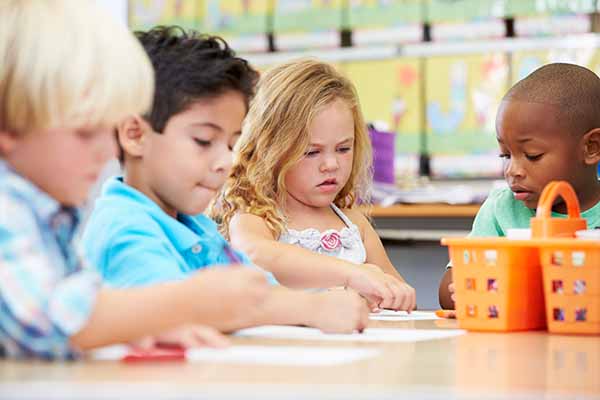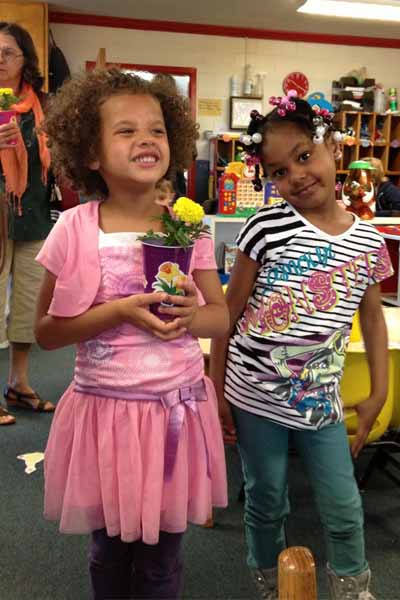Pre-Kindergarten Class
The children in our Pre-k class are gearing up for the start of elementary school. We recognize the importance of preparing each child for the years of formal schooling ahead. Our teachers take this responsibility very seriously, working with each child to move them toward that goal. While doing this, they are committed to presenting developmentally appropriate activities that help the children learn and grow, moving along the developmental continuum.
The curriculum for Pre-K children focuses on the following:
Social-emotional development
As young children mature, they are always learning new ways to manage their feelings, follow limits and expectations, and take care of their own needs appropriately. The pre-k teachers guide the children in handling the different social situations that come up daily. They help children learn to work with their peers, using their “words” to resolve conflict and to recognize that others’ feelings about a situation might be different from their own and that is okay. Puppets and role play are used to help the children practice ways to solve problems.
Physical development
Pre-k children love to move and they enjoy finding new ways to move (spin, gallop, skip). Our program provides plenty of time to exercise these big muscles by playing outside as often as we can. We are blessed to have good sized and well shaded yards so many times the teachers can take the daily learning experiences outside and conduct their lessons there. Our teachers plan many activities to increase the childrens’ fine motor skills. The children use small, precise finger and hand movement as they cut with scissors, practice writing the letters of their name, work with play dough and clay, string beads, write notes or letters to friends and family, etc. The writing and art areas are set up to provide many different mediums for children to use in their notes and art work.
Language development
Helping children develop their language skills is something that takes place in everything our children do while at school. They are challenged to grow their vocabulary through listening to stories and even writing about what they did at school today. Children are encouraged to write using inventive spelling (when a child spells a word on their own by writing the letters they ‘hear’ when they say the word). Teachers also have children dictate stories or experiences to them as they write out the corresponding words. Children then are able to read or retell what is in print because it was their own story.
Cognitive development
Our curriculum in pre-k uses a “study” model – for example the children may study things with wheels. For a matter of weeks, they will discuss all kinds of things with wheels and how they work. In the science area, they may do experiments with wheels of different sizes and even talk about how their size allows things to move differently. Preschoolers ability to sustain attention to tasks or projects allows them to work on something over a period of days. Teachers encourage them to plan and pursue a variety of appropriately challenging tasks. Our teachers guide children in thinking through problems and considering several possible solutions or strategies. The curiosity of children of this age makes it easy to extend learning, encouraging children to use a variety of resources to find answers to their questions.
Literacy development
A pre-k childs awareness of letters and sounds is fostered by being read to by an adult who takes time to talk about letters on the page, the sound that they make, and how a series of letters strung together makes a word. Our teachers use ongoing assessment to design lessons that meet each child at their individual level. Individual and small group instruction is used to introduce and practice new pre-reading skills. Children’s ability to comprehend and respond to books is strengthened through practice. You will see samples all around the pre-k classroom of stories children have listened and responded to through pictures, writing, and retelling/dictating. The work is their own because they have taken a major role in its production.
Mathematics development
Children of this age love to count as high as they can, “measure” the size of something using a non-conventional measuring device (string, blocks, hands, feet), sort and compare objects by properties (color, size, shape), use a timer to track length of time at a given area, make and/or repeat a pattern, and take part in creating a simple graph to organize data. Like in other subjects, our teachers design lessons that involve active learning on the part of the children.
Science and Technology / Social Studies / The Arts
Pre-k children love learning about living things. Teachers provide opportunities for them to explore the characteristics of living things and discover how they survive in their natural habitats. Topics about the earth, the planets and the solar systems are explored through books and educational videos. The computer in the classroom provides opportunities for children to become familiar with the keyboard and how to “research” about a topic they are curious about.


